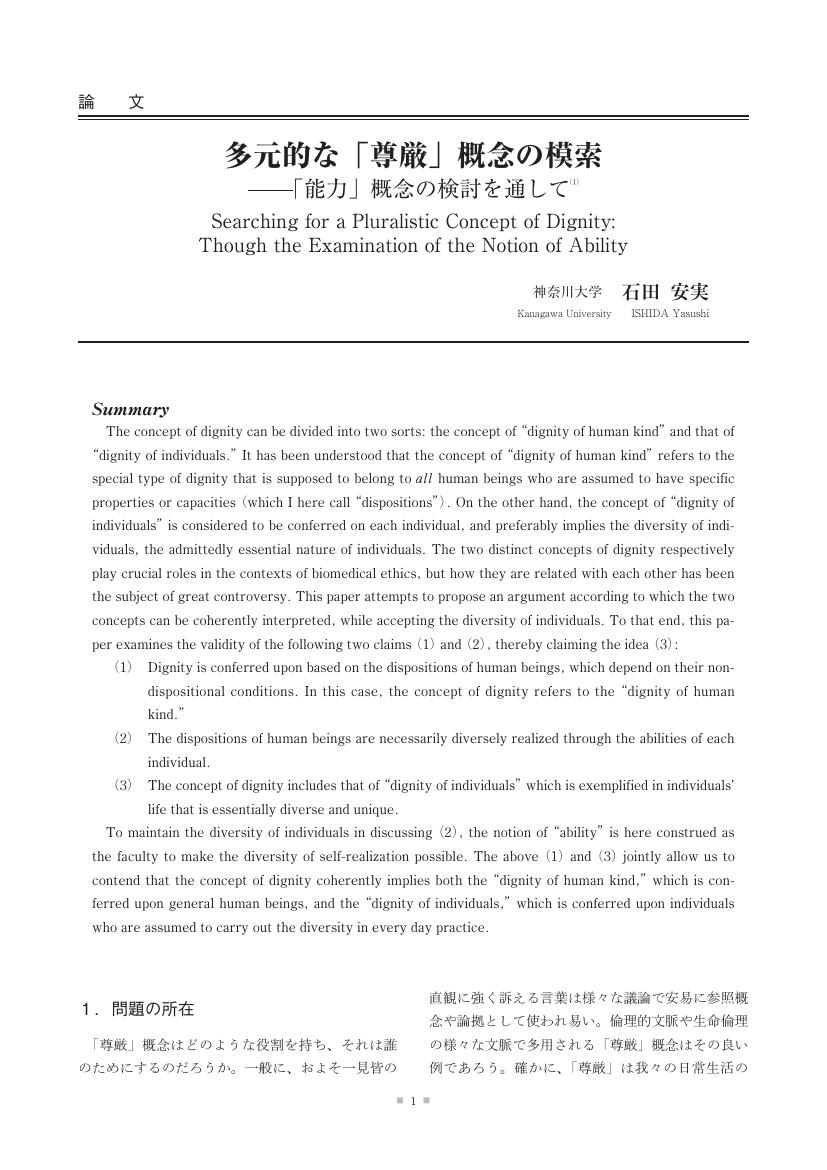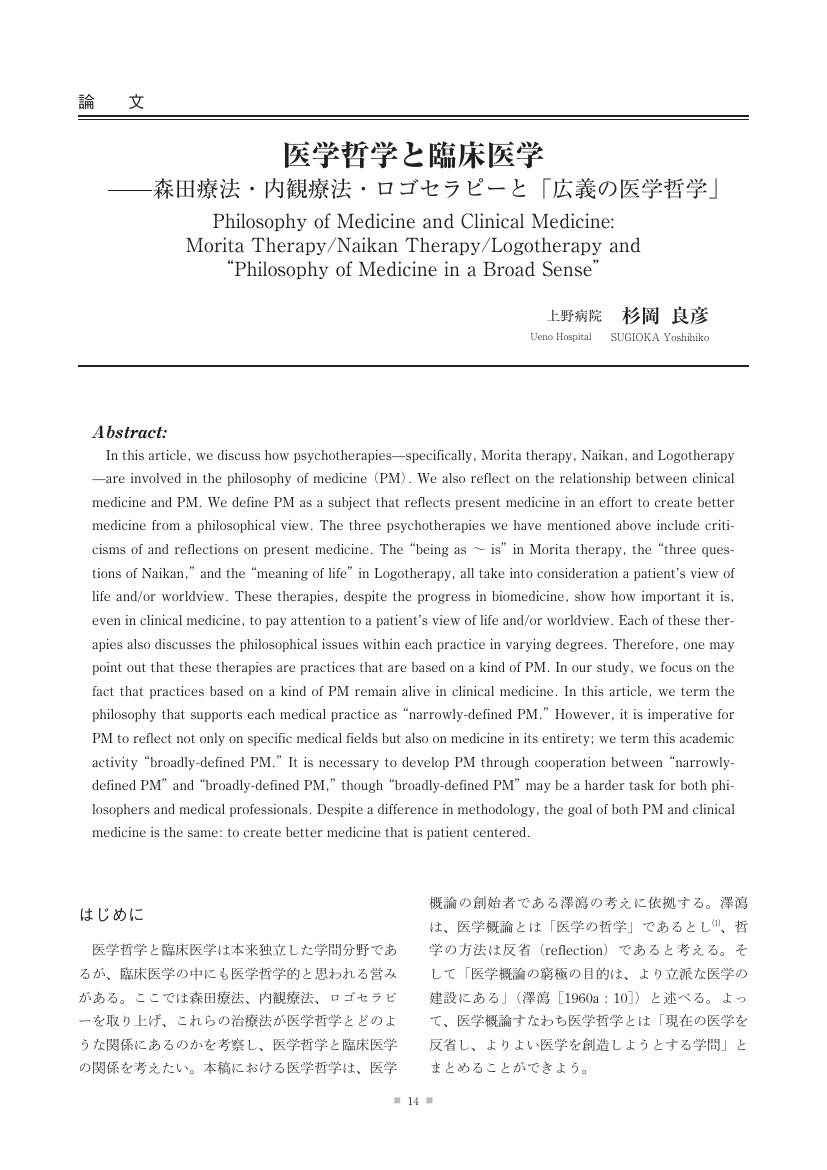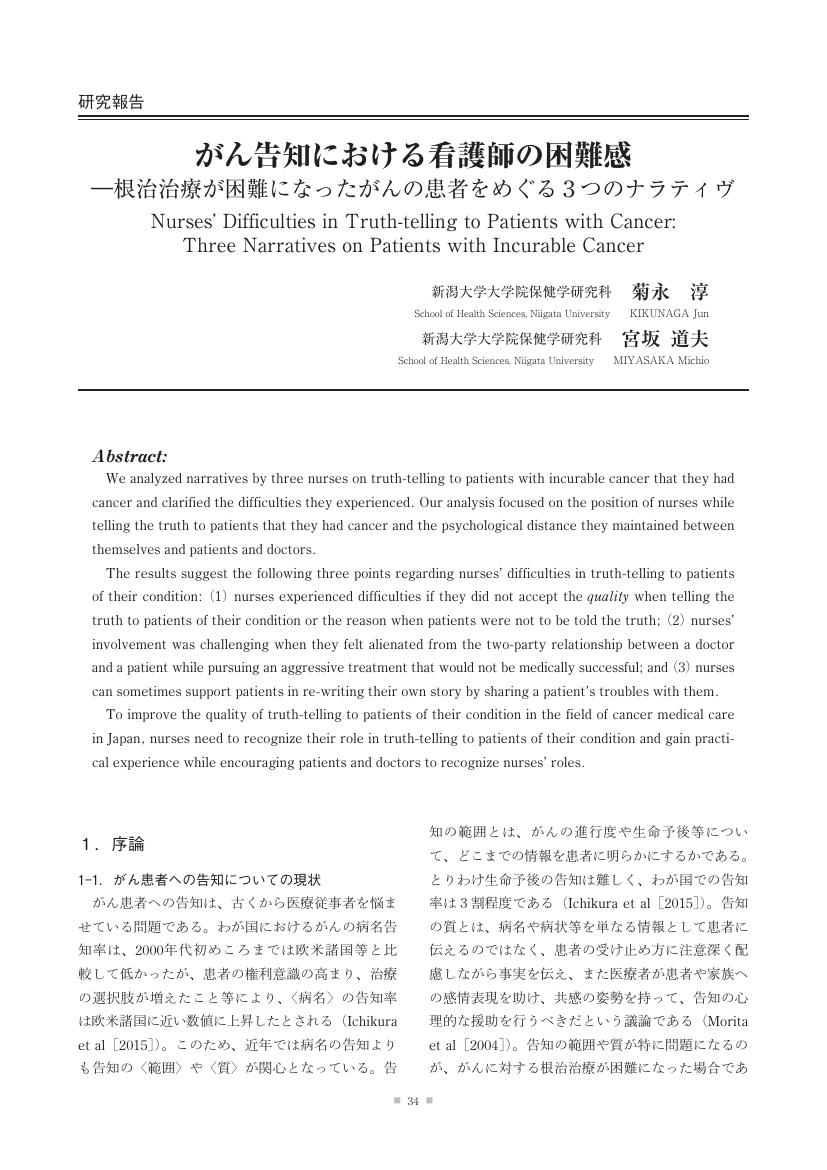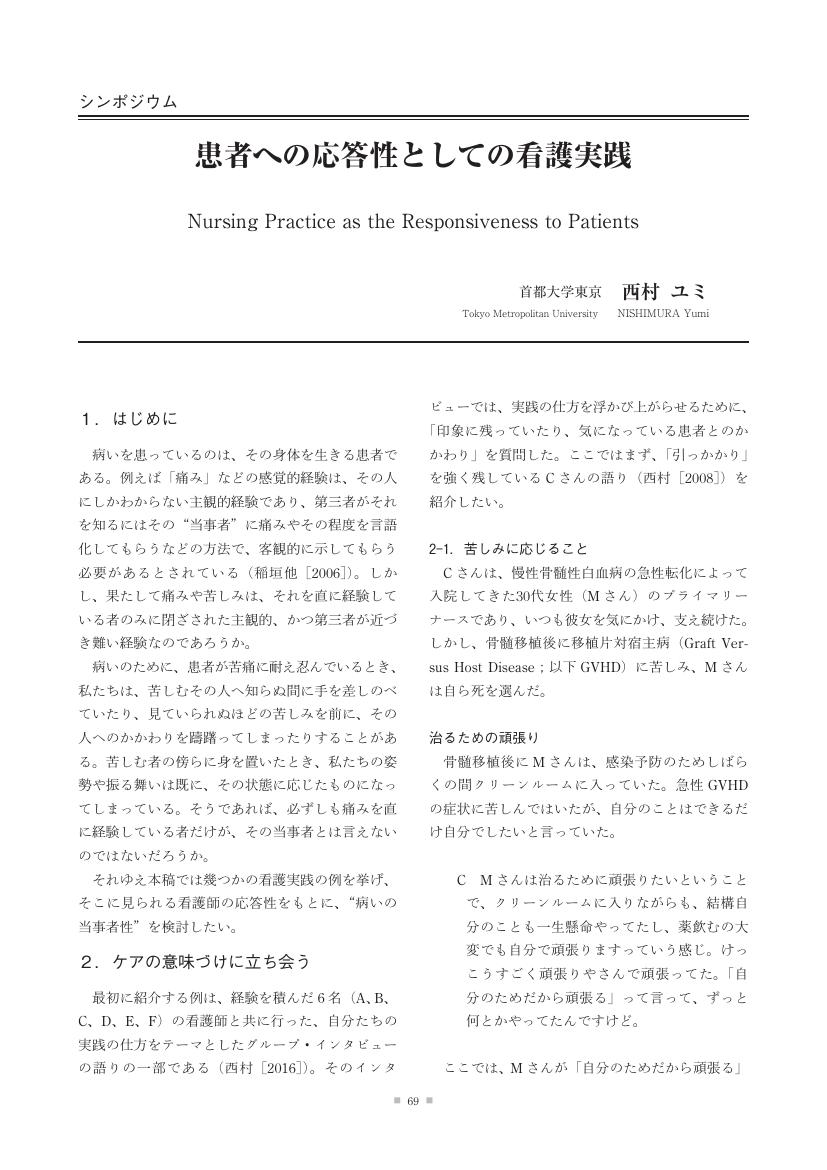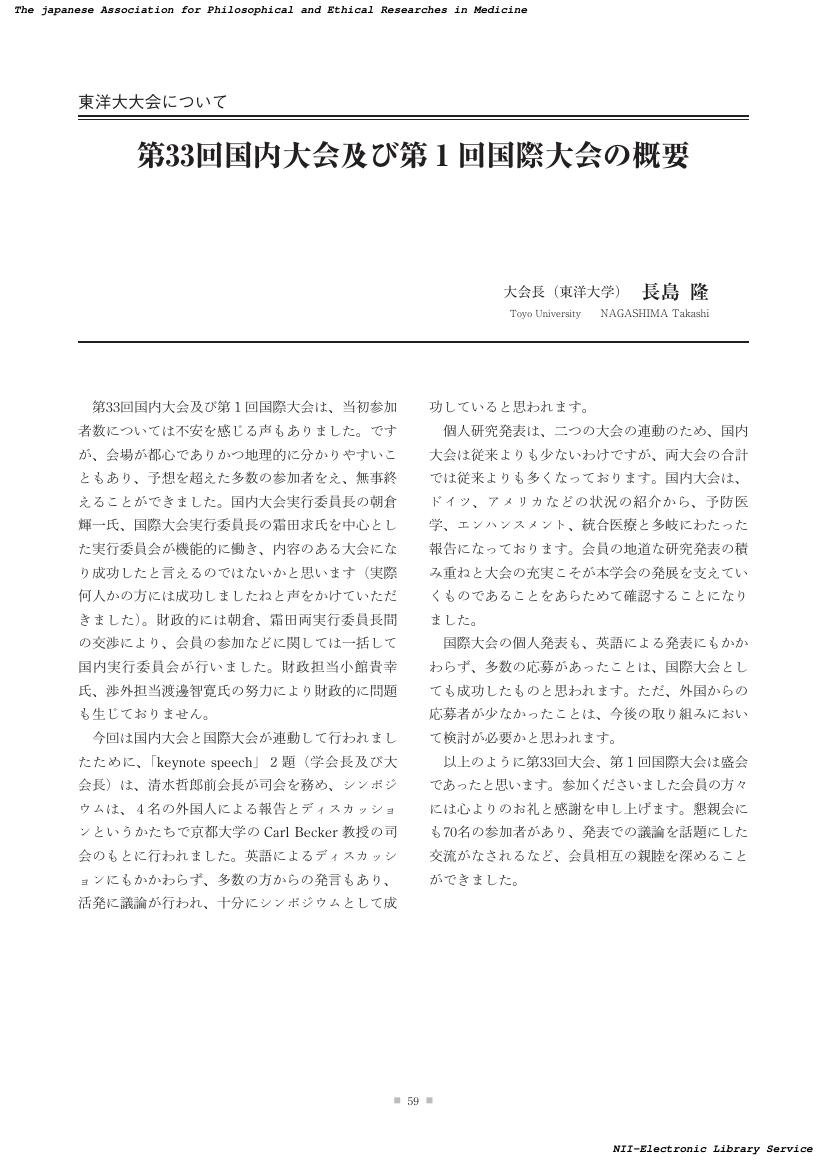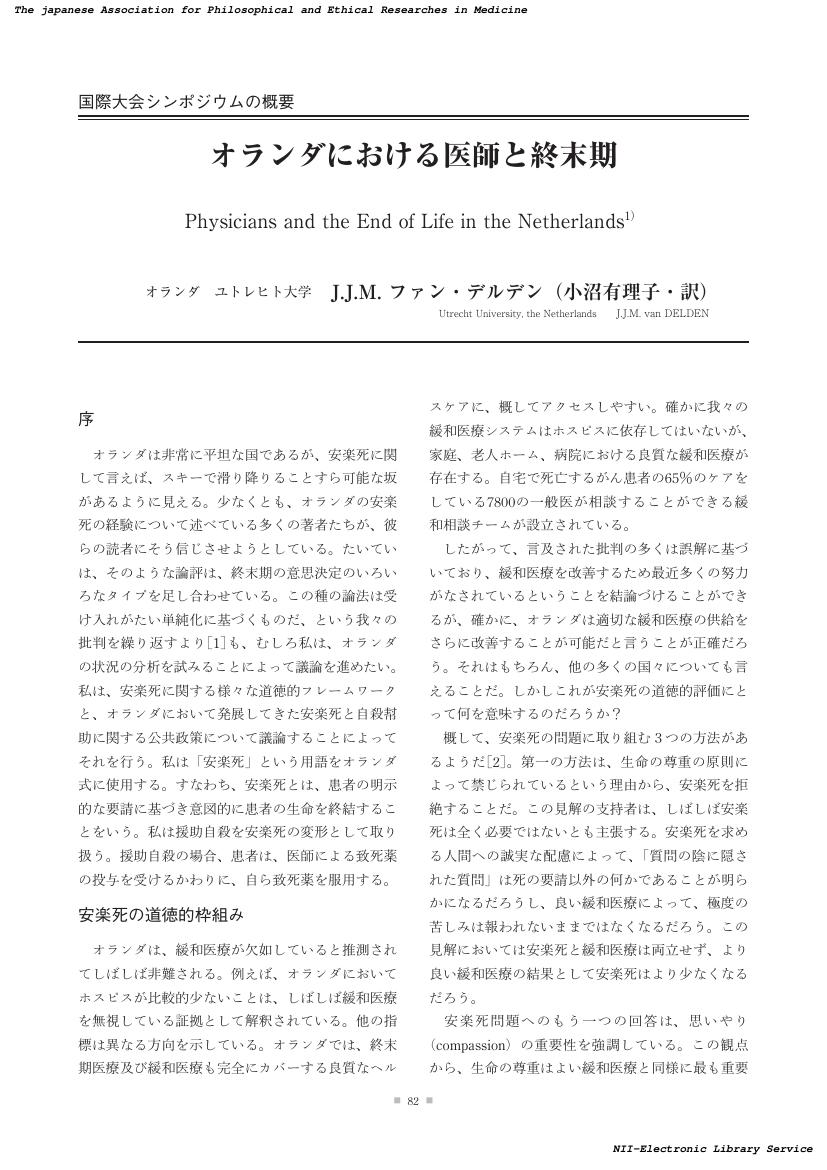1 0 0 0 OA 自閉スペクトラム症当事者(との共同)研究をめぐって
- 著者
- 清水 光恵
- 出版者
- 日本医学哲学・倫理学会
- 雑誌
- 医学哲学 医学倫理 (ISSN:02896427)
- 巻号頁・発行日
- vol.35, pp.71, 2017 (Released:2018-06-20)
1 0 0 0 OA 多元的な「尊厳」概念の模索 「能力」概念の検討を通して
- 著者
- 石田 安実
- 出版者
- 日本医学哲学・倫理学会
- 雑誌
- 医学哲学 医学倫理 (ISSN:02896427)
- 巻号頁・発行日
- vol.35, pp.1, 2017 (Released:2018-06-20)
1 0 0 0 OA 医学哲学と臨床医学 森田療法・内観療法・ロゴセラピーと「講義の医学哲学」
- 著者
- 杉岡 良彦
- 出版者
- 日本医学哲学・倫理学会
- 雑誌
- 医学哲学 医学倫理 (ISSN:02896427)
- 巻号頁・発行日
- vol.35, pp.14, 2017 (Released:2018-06-20)
1 0 0 0 OA がん告知における看護師の困難感 根治治療が困難になったがんの患者をめぐる3つのナラティヴ
- 著者
- 菊永 淳 宮坂 道夫
- 出版者
- 日本医学哲学・倫理学会
- 雑誌
- 医学哲学 医学倫理 (ISSN:02896427)
- 巻号頁・発行日
- vol.35, pp.35, 2017 (Released:2018-06-20)
1 0 0 0 OA 誕生と死の〈あいだ〉を生きる人間 〈シンポジウムのまとめ〉
- 著者
- 丸橋 裕
- 出版者
- 日本医学哲学・倫理学会
- 雑誌
- 医学哲学 医学倫理 (ISSN:02896427)
- 巻号頁・発行日
- vol.35, pp.49, 2017 (Released:2018-06-20)
1 0 0 0 OA 災害時における調査研究の実施体制
- 著者
- 飯島 祥彦
- 出版者
- 日本医学哲学・倫理学会
- 雑誌
- 医学哲学 医学倫理 (ISSN:02896427)
- 巻号頁・発行日
- vol.34, pp.43, 2016 (Released:2018-05-07)
1 0 0 0 OA がん闘病記の社会学 患者の声を聴く
- 著者
- 門林 通子
- 出版者
- 日本医学哲学・倫理学会
- 雑誌
- 医学哲学 医学倫理 (ISSN:02896427)
- 巻号頁・発行日
- vol.34, pp.59, 2016 (Released:2018-05-07)
1 0 0 0 OA 人間同士の出会いから生まれる「いのち」は生死を貫いて
- 著者
- 細井 順
- 出版者
- 日本医学哲学・倫理学会
- 雑誌
- 医学哲学 医学倫理 (ISSN:02896427)
- 巻号頁・発行日
- vol.34, pp.64, 2016 (Released:2018-05-07)
1 0 0 0 OA 患者への応答性としての看護実践
- 著者
- 西村 ユミ
- 出版者
- 日本医学哲学・倫理学会
- 雑誌
- 医学哲学 医学倫理 (ISSN:02896427)
- 巻号頁・発行日
- vol.34, pp.69, 2016 (Released:2018-05-07)
1 0 0 0 OA 医学研究の倫理審査委員会における非医学系倫理委員の意義と役割
- 著者
- 瀬戸山 晃一
- 出版者
- 日本医学哲学・倫理学会
- 雑誌
- 医学哲学 医学倫理 (ISSN:02896427)
- 巻号頁・発行日
- vol.34, pp.79, 2016 (Released:2018-05-07)
- 出版者
- 日本医学哲学・倫理学会
- 雑誌
- 医学哲学 医学倫理 (ISSN:02896427)
- 巻号頁・発行日
- vol.33, pp.97-104, 2015-09-30 (Released:2018-02-01)
1 0 0 0 OA 精神医学が考慮するべき「第3のペイン」 臨死期の患者における脳の機能障害による苦痛
- 著者
- 新山 喜嗣
- 出版者
- 日本医学哲学・倫理学会
- 雑誌
- 医学哲学 医学倫理 (ISSN:02896427)
- 巻号頁・発行日
- vol.34, pp.1-10, 2016 (Released:2018-05-07)
1 0 0 0 OA 記憶障害 高次脳機能障害者の手記の解釈
- 著者
- 中野 桂子
- 出版者
- 日本医学哲学・倫理学会
- 雑誌
- 医学哲学 医学倫理 (ISSN:02896427)
- 巻号頁・発行日
- vol.34, pp.11-21, 2016 (Released:2018-05-07)
1 0 0 0 OA リーン・ラダー・ベイカーの構成説における人間の概念分析・
- 著者
- 峯村 優一
- 出版者
- 日本医学哲学・倫理学会
- 雑誌
- 医学哲学 医学倫理 (ISSN:02896427)
- 巻号頁・発行日
- vol.34, pp.22-31, 2016 (Released:2018-05-07)
1 0 0 0 OA 「先制医療」の理論的構造について
- 著者
- 村岡 潔
- 出版者
- 日本医学哲学・倫理学会
- 雑誌
- 医学哲学 医学倫理 (ISSN:02896427)
- 巻号頁・発行日
- vol.33, pp.52-58, 2015-09-30 (Released:2018-02-01)
Recently, a modern medical strategy has been proposed in Japan. It is called "Preemptive Medicine." This paper described the main features of "Preemptive Medicine" and its theoretical framework from the medical philosophy viewpoint. First, I examined a definition and concept of "Preemptive Medicine." This medical strategy presents a preemptive intervention for persons at risk to become ill in the near future. Risk prediction depends on presymptomatic tests like genetic testing that could reveal hereditary characteristics and other possible biomarkers. This predictive medical intervention prior to onset might be a new fashion in preventive medicine. Second, I reviewed the definition and characteristics of existing preventive medicine in comparison with those of "Preemptive Medicine." I then noted that "Preemptive Medicine" was the primary type of preventive medicine, so-called primary prevention. Third, I surveyed a typical single book on "Preemptive Medicine" in Japan edited by Hiroo Imura. It depicted the present state of and some problems for realization of the new approach. Fourth, I considered the meaning of intervention for "potential patients" or persons without illness at present but with some risk of becoming ill. They could be distressed over their predicted future disease. Furthermore, the efficacy of the prevention is not sufficiently proven from the viewpoint of Evidence Based Medicine. Finally, I concluded that the characteristics of "Preemptive Medicine" are, as follows: (1) "Preemptive Medicine" is a new form of preventive medicine; (2) its goal is personalized primary prevention; (3) it might have some psychological and social implications for harm to "potential patients"; and (4) it needs to show validity in early predictive intervention.
1 0 0 0 OA 第33回国内大会及び第1回国際大会の概要(東洋大大会について)
- 著者
- 長島 隆
- 出版者
- 日本医学哲学・倫理学会
- 雑誌
- 医学哲学 医学倫理 (ISSN:02896427)
- 巻号頁・発行日
- vol.33, pp.59, 2015-09-30 (Released:2018-02-01)
1 0 0 0 OA 多文化社会における医療倫理(国際大会 基調講演)
- 著者
- 小出 泰士
- 出版者
- 日本医学哲学・倫理学会
- 雑誌
- 医学哲学 医学倫理 (ISSN:02896427)
- 巻号頁・発行日
- vol.33, pp.60-65, 2015-09-30 (Released:2018-02-01)
1 0 0 0 OA グローバル時代における地域医療と医療倫理 : 3.11以後の時代に(国際大会 基調講演)
- 著者
- 長島 隆
- 出版者
- 日本医学哲学・倫理学会
- 雑誌
- 医学哲学 医学倫理 (ISSN:02896427)
- 巻号頁・発行日
- vol.33, pp.66-73, 2015-09-30 (Released:2018-02-01)
- 著者
- ハイネマン トーマス 松田 純
- 出版者
- 日本医学哲学・倫理学会
- 雑誌
- 医学哲学 医学倫理 (ISSN:02896427)
- 巻号頁・発行日
- vol.33, pp.74-81, 2015-09-30 (Released:2018-02-01)
1 0 0 0 OA オランダにおける医師と終末期(国際大会シンポジウムの概要)
- 著者
- ファン・デルデン J.J.M. 小沼 有理子
- 出版者
- 日本医学哲学・倫理学会
- 雑誌
- 医学哲学 医学倫理 (ISSN:02896427)
- 巻号頁・発行日
- vol.33, pp.82-86, 2015-09-30 (Released:2018-02-01)

